过去进行时的用法
英语时态:过去进行时

英语时态:过去进行时一、定义过去进行时表示过去某一段时间或某个时间点正在发生的动作或状态。
过去进行时动作发生的时间是“过去”,动作的状态是“正在进行中”。
二、时间状语过去进行时常与表示过去的时间状语连用,主要包括:1)过去的具体时刻:at nine/eleven/...+yesterday/last night/last Sunday/April3th/...,如at nine last Sunday。
2)过去的这个时候:at this time+yesterday/last night/last Sunday/April3th/...,如at this time yesterday。
3)过去的时间段:from eight to ten yesterday morning,yesterday,last night,lastSaturday,the whole morning等。
4)at that time,at that moment。
5)when,while,as引导的过去时间状语从句。
三、动词形式过去进行时的谓语部分由be动词的过去式加动词现在分词(“动词-ing”)构成。
be动词根据主语选择用was或were。
(注:在过去进行时中,be动词为助动词。
)动词现在分词(动词-ing)的变化规则如下:(1)常规动词,直接在动词词尾加ing。
示例:be-beingcook-cookingstudy-studyingwash-washing(2)以不发音e结尾的动词,去掉e,再加ing。
示例:give-givingmake-makingtake-takinguse-using(3)以ie结尾的动词,将ie变为y,再加ing。
示例:die-dyinghie-hyinglie-lyingtie-tying(4)以一个辅音字母结尾的重读闭音节动词(从后往前看字母是辅音、元音、辅音(play除外)),双写最后一个辅音字母,再加ing。
初中过去进行时的用法
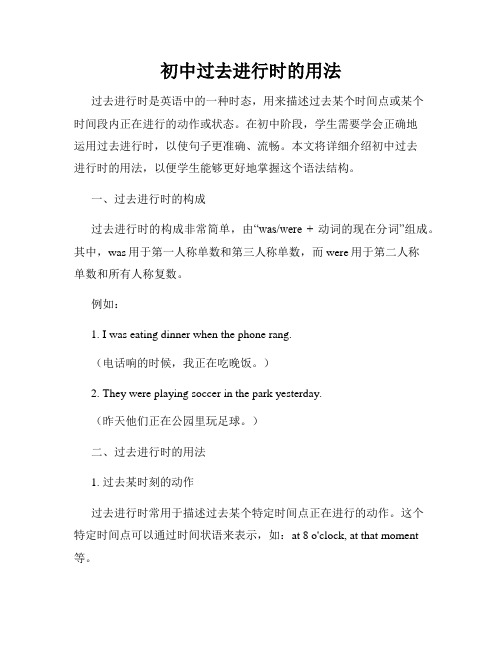
初中过去进行时的用法过去进行时是英语中的一种时态,用来描述过去某个时间点或某个时间段内正在进行的动作或状态。
在初中阶段,学生需要学会正确地运用过去进行时,以使句子更准确、流畅。
本文将详细介绍初中过去进行时的用法,以便学生能够更好地掌握这个语法结构。
一、过去进行时的构成过去进行时的构成非常简单,由“was/were + 动词的现在分词”组成。
其中,was用于第一人称单数和第三人称单数,而were用于第二人称单数和所有人称复数。
例如:1. I was eating dinner when the phone rang.(电话响的时候,我正在吃晚饭。
)2. They were playing soccer in the park yesterday.(昨天他们正在公园里玩足球。
)二、过去进行时的用法1. 过去某时刻的动作过去进行时常用于描述过去某个特定时间点正在进行的动作。
这个特定时间点可以通过时间状语来表示,如:at 8 o'clock, at that moment 等。
例如:1. He was studying at 9 p.m. last night.(昨晚九点钟,他正在学习。
)2. We were watching a movie when it started raining.(当开始下雨时,我们正在看电影。
)2. 过去某个时间段的动作过去进行时还可以用来描述在过去某个时间段内正在进行的动作。
例如:1. She was playing the piano for two hours yesterday afternoon.(昨天下午她一直在弹钢琴,弹了两个小时。
)2. They were talking on the phone all morning.(他们整个上午都在电话中交谈。
)3. 过去同时进行的动作过去进行时还可以用来描述过去两个或两个以上的动作同时进行。
例如:1. While I was cooking dinner, my sister was doing her homework.(我在煮晚饭的时候,我妹妹正在做她的作业。
过去进行时的用法
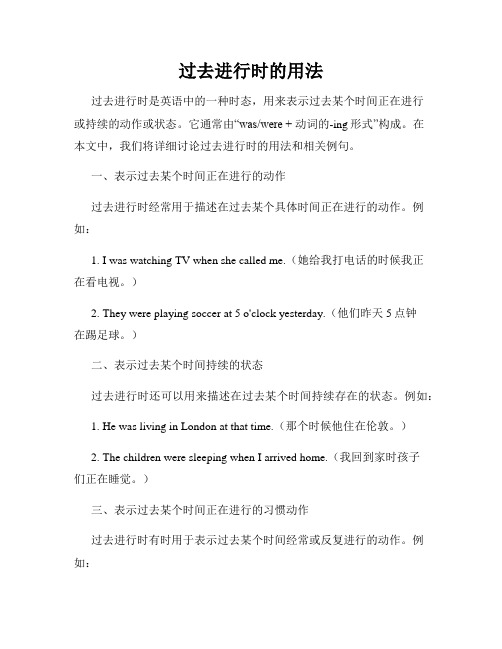
过去进行时的用法过去进行时是英语中的一种时态,用来表示过去某个时间正在进行或持续的动作或状态。
它通常由“was/were + 动词的-ing形式”构成。
在本文中,我们将详细讨论过去进行时的用法和相关例句。
一、表示过去某个时间正在进行的动作过去进行时经常用于描述在过去某个具体时间正在进行的动作。
例如:1. I was watching TV when she called me.(她给我打电话的时候我正在看电视。
)2. They were playing soccer at 5 o'clock yesterday.(他们昨天5点钟在踢足球。
)二、表示过去某个时间持续的状态过去进行时还可以用来描述在过去某个时间持续存在的状态。
例如:1. He was living in London at that time.(那个时候他住在伦敦。
)2. The children were sleeping when I arrived home.(我回到家时孩子们正在睡觉。
)三、表示过去某个时间正在进行的习惯动作过去进行时有时用于表示过去某个时间经常或反复进行的动作。
例如:1. Every morning, I was drinking a cup of coffee before going to work.(每天早晨,我都会在上班前喝一杯咖啡。
)2. When I was a child, I was playing the piano every day.(当我还是个孩子的时候,我每天都在弹钢琴。
)四、与过去进行时相关的时间状语在使用过去进行时时,我们经常会用到一些表示过去的时间状语,例如:at that time(那个时候)、yesterday(昨天)、last week(上周)等等。
这些时间状语可以帮助我们更加准确地描述过去进行时的动作或状态。
总结:过去进行时用于描述过去某个时间正在进行或持续的动作或状态。
(完整版)过去进行时的用法详解
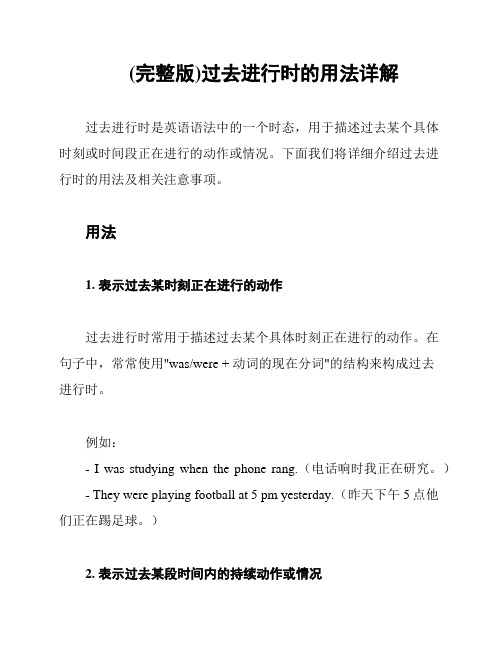
(完整版)过去进行时的用法详解过去进行时是英语语法中的一个时态,用于描述过去某个具体时刻或时间段正在进行的动作或情况。
下面我们将详细介绍过去进行时的用法及相关注意事项。
用法1. 表示过去某时刻正在进行的动作过去进行时常用于描述过去某个具体时刻正在进行的动作。
在句子中,常常使用"was/were + 动词的现在分词"的结构来构成过去进行时。
例如:- I was studying when the phone rang.(电话响时我正在研究。
)- They were playing football at 5 pm yesterday.(昨天下午5点他们正在踢足球。
)2. 表示过去某段时间内的持续动作或情况过去进行时还可以用来描述过去某段时间内的持续动作或情况。
在这种情况下,我们可以使用"was/were + 动词的现在分词"来构成句子。
例如:- She was working hard all day yesterday.(昨天整天她都在努力工作。
)- We were waiting for the bus for two hours.(我们等了两个小时的公交车。
)3. 与过去时态的区别过去进行时与过去时态的区别在于强调动作的持续性,过去进行时更加注重描述过去某个时刻正在进行的动作,而过去时态则着重描述发生在过去的动作或情况。
例如:- I was reading a book when he called.(他打电话时,我正在看书。
)(过去进行时)- I read a book before he called.(他打电话之前,我看了一本书。
)(过去时态)注意事项1. 过去进行时通常与表示过去的时间状语连用,以更准确地表达动作发生的时间点或时间段。
2. 过去进行时不能用于表示经常性的动作或事实,而只适用于特定的过去时刻或时间段。
3. 当过去进行时与其他过去时态同时出现时,我们需要根据语境来确定时间的先后顺序。
过去进行时的基本用法
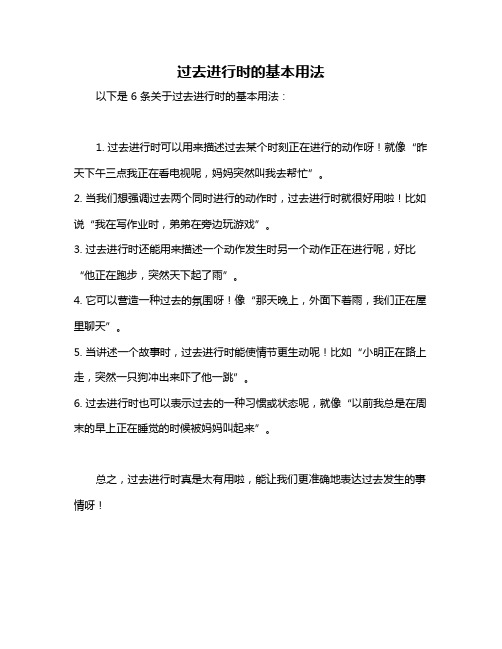
过去进行时的基本用法
以下是 6 条关于过去进行时的基本用法:
1. 过去进行时可以用来描述过去某个时刻正在进行的动作呀!就像“昨天下午三点我正在看电视呢,妈妈突然叫我去帮忙”。
2. 当我们想强调过去两个同时进行的动作时,过去进行时就很好用啦!比如说“我在写作业时,弟弟在旁边玩游戏”。
3. 过去进行时还能用来描述一个动作发生时另一个动作正在进行呢,好比“他正在跑步,突然天下起了雨”。
4. 它可以营造一种过去的氛围呀!像“那天晚上,外面下着雨,我们正在屋里聊天”。
5. 当讲述一个故事时,过去进行时能使情节更生动呢!比如“小明正在路上走,突然一只狗冲出来吓了他一跳”。
6. 过去进行时也可以表示过去的一种习惯或状态呢,就像“以前我总是在周末的早上正在睡觉的时候被妈妈叫起来”。
总之,过去进行时真是太有用啦,能让我们更准确地表达过去发生的事情呀!。
过去进行时

entered the classroom.
prepare for
(Black先生走进教室的时候学生们正在准备功课。) was talking
10.The teacher _____________to some parents when I saw her.
(我见到老师的时候她正在和家常谈话。)[哎,回家可能要挨揍 了,哇……]
2.我正在做饭,就在那时她敲门了。 I was cooking when(就在那时)she knocked at the door. when=and then就在那时 when当...... 时侯
4.过去进行时可表示两个动作同时进行.
当我在看电视时,我母亲在做饭。
While I was watching TV,my mother was cooking.
(我走进屋子时他们正在看报纸。) 8.What __w__e_r_e_ you __d__o_in_g___at five yesterday afternoon?
(昨天下午5点你在做什么?)
were preparing 9.The students ___________ _for their lessons when Mr.Black
4.今早给你打电话的时候你正在干什么?
What were you doing when I called you up this morning?
5.当他正睡觉的时候他梦见了UFO.
While he was sleeping ,he dreamed about UFO.
1.I __w_a_s__d_o_in_g__ my homework when Mike ___c_a_m_e___ last night.
过去进行时完美版课件

根据时间点选择
如果描述的是过去某个具体的时 间点或时间段发生的动作,应选 择过去进行时;如果与现在的状 态或结果有关,应选择现在完成
时。
06 练习与巩固
选择题练习
总结词
考察基础概念
详细描述
设计一系列选择题,测试学生对过去进行时的基本概念和用法的掌握程度,包括时态的构成、时间状 语的选择以及与过去其他时态的区分等。
02
它强调过去某个时间点上动作的 持续性,通常与时间段连用的时 间状语连用,如“at 8 o'clock yesterday morning”。
过去进行时的基本形式
过去进行时的基本形式为 “was/were + -ing”,其中 “was”用于第三人称单数, “were”用于第一人称、第二人称 和第三人称复数。
04 过去进行时的用法和例句
表示过去某个时间正在进行的动作
01
02
03
04
总结词
描述过去某个时间点正在发生 的动作,强调动作的持续性。
例句
昨天下午三点,我正在家里看 书。
例句
昨晚八点左右,他正在看电视 。
例句
上个星期天早上,他们正在公 园里跑步。
表示过去某个时间段内一直在进行的动作
总结词
描述过去某个时间段内 一直在进行的动作,强
可以互换使用
在一些情况下,过去进行时和现在完成时可以互换使用,但需要根 据语境和表达的重点来选择。
在实际应用中的选择
根据语境选择
根据上下文和语境来选择使用过 去进行时还是现在完成时,以确
保表达的准确性和自然度。
根据表达重点选择
如果需要强调动作的持续性或正 在进行的情景,可以选择过去进 行时;如果需要强调动作的结果 或对现在的影响,可以选择现在
英语时态:过去进行时
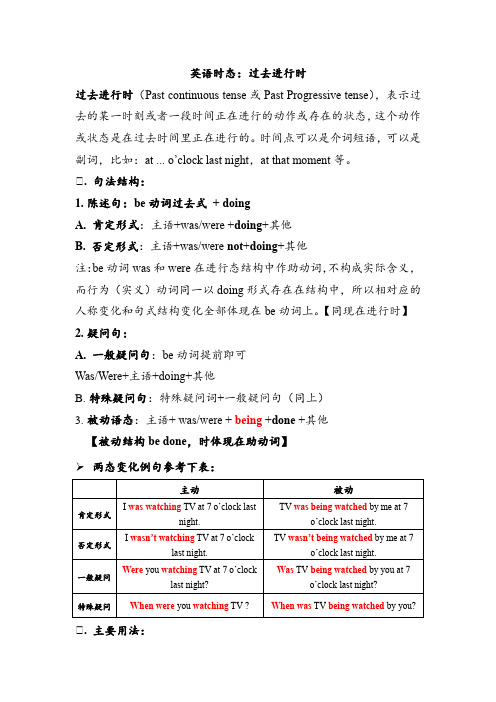
英语时态:过去进行时过去进行时(Past continuous tense或Past Progressive tense),表示过去的某一时刻或者一段时间正在进行的动作或存在的状态,这个动作或状态是在过去时间里正在进行的。
时间点可以是介词短语,可以是副词,比如:at ... o’clock last night,at that moment等。
Ⅰ. 句法结构:1.陈述句:be动词过去式+ doingA. 肯定形式:主语+was/were +doing+其他B. 否定形式:主语+was/were not+doing+其他注:be动词was和were在进行态结构中作助动词,不构成实际含义,而行为(实义)动词同一以doing形式存在在结构中,所以相对应的人称变化和句式结构变化全部体现在be动词上。
【同现在进行时】2.疑问句:A. 一般疑问句:be动词提前即可Was/Were+主语+doing+其他B.特殊疑问句:特殊疑问词+一般疑问句(同上)3.被动语态:主语+ was/were + being +done +其他【被动结构be done,时体现在助动词】➢两态变化例句参考下表:Ⅰ. 主要用法:1.(基本用法)过去进行时主要表示过去某一时间正在进行的动作。
He fell asleep when he was reading.2.用于描写故事情景,或提供故事发生的时间背景。
The fire was burning. Children were crying. Women were running about and men were trying to put it out.3.用过去进行时表示现在,主要是为了使语气委婉、客气。
此类动词主要有hope, wonder, think, expect等。
【一般过去时也有类似用法,但比较而言,用过去进行时显得更客气,更加不肯定。
】I was wondering if you can give me a hand.4.表示从过去某一时间看将要发生的动作,常表示过去“渐渐”、“快要”、“越来越”、“马上”等含义,常见的此类动词有come,go,start,begin,leave,arrive,get,become,turn等非持续性(位置的瞬间移动或状态的瞬间改变)动词,偶尔有些持续性动词如do,stay,take 等常表示过去“将要”。
- 1、下载文档前请自行甄别文档内容的完整性,平台不提供额外的编辑、内容补充、找答案等附加服务。
- 2、"仅部分预览"的文档,不可在线预览部分如存在完整性等问题,可反馈申请退款(可完整预览的文档不适用该条件!)。
- 3、如文档侵犯您的权益,请联系客服反馈,我们会尽快为您处理(人工客服工作时间:9:00-18:30)。
过去进行时的用法过去进行时的用法一、过去进行时概念:表示过去某时某刻正在进行的动作(不强调是否完成)。
二、过去进行时结构:1. 过去进行时由“主语+was/were + 现在分词”构成如:We were having supper when the phone rang.2. 过去进行时的否定式由“主语+was/were not +现在分词”构成如:This time yesterday Jack was not watching TV. He was repairing his bike.3. 过去进行时的疑问式由“was/were +主语+ 现在分词”构成如:Were you playing basketball at four yesterday afternoon? 昨天下午四点你们在打篮球吗?三、时间状语at+点时间+yesterday等过去的时间,from nine to ten last evening, when, while, at that time.四、现在分词1. 在动词原形后直接加-ing 如:look-looking cook-cooking read-reading2. 以不发音字母e结尾的动词,去掉e再加-ing 如: write-writing live-living3. 以重读闭音节结尾且末尾只有一个辅音字母的动词,双写该辅音字母后再加-ing 如:begin-beginning swim-swimming sit-sitting4. 少数几个以ie结尾的动词,要变ie为y,再加-ing 如:tie-tying die-dying lie-lying五、过去进行时特殊用法1、表示按计划、安排过去将要发生的事。
用于come, go, leave,start, arrive等表示位置转移的动词时,也可以用过去进行时表示过去将要发生的动作。
如:He told me that he was going soon. 他告诉我他很快就要走了。
2、过去进行时还可和when结构遥相呼应,含有意外之意。
I was walking in the street when someone called me. 我正在街上走时突然有人喊我。
3、与always, constantly(时刻;不断地,时常地)等词连用,表示感情色彩。
如:The girl was always changing her mind. 这女孩老六、when 和while的用法区别①when是at or during the time that,既指时间点,也可指一段时间;while是during the time that,只指一段时间,因此when 引导的时间状语从句中的动词可以是终止性动词,也可以是延续性动词,而while从句中的动词必须是延续性动词。
②when 说明从句的动作和主句的动作可以是同时,也可以是先后发生;while 则强调主句的动作在从句动作的发生的过程中或主从句两个动作同时发生。
③由when引导的时间状语从句,主句用过去进行时,从句应用一般过去时;如果从句和主句的动作同时发生,两句都用过去进行时的时候,多用while引导,如:a. When the teacher came in, we were talking.当此句改变主从句的位置时,则为:While we were talking, the teacher came in.过去进行时习题练习一、填入以下单词的正确形式1. It was warm, so I ________off my coat (take).2. John_________ (take) a photograph of me while I __________(not/look).3. Jane______________________(wait) for me when I __________(arrive).4. Sue wasn’t hungry, so she ____________ anything. (eat)5. It was hard work carrying the bags. They _____________very heavy.(be)6.When I was young, I____________(want) to be a bus driver.7. My brother came into the bedroom while I __________ (dance). 8. ________he ________ (lie) on the ground at nine yesterday evening?9. What ________ Jim ________ (write) when the teacher came in? 10. The Reads _________ (not have) lunch when I got to their house.11. Mike and I ________(play) basketball at that time yesterday afternoon.二、.按要求转换下列句型。
1. We were having a PE class at four yesterday afternoon.(改为否定句)We ______ ______ a PE class at four yesterday afternoon.2. Kate was reviewing her lessons at eight last night.(改为一般疑问句,并做肯、否定回答)________ Kate _______her lessons at eight last night? ________ , she ________. ________ , she _______ .3. He ran in the park.(用at this time yesterday改写)He _______ ________in the park at this time yesterday.4. They were playing computer games at nine last night.(对划线部分提问)________ ________ they _______ at nine last night?5. I was reading a novel at three yesterday afternoon.(对划线部分提问)________ ________ you _______ at three yesterday afternoon?三、根据汉语提示,完成下列句子,每空填一词。
1.那时他们不在打排球。
They _______ _______ volleyball at that time.2.当你回来时,他在看电视吗?________ he ________TV whenyou came back?3.昨天中午他在哪里等你?______ _______ he _______for you at noon yesterday?4.当我离开时,他正在做家庭作业。
He _____ _____ his homework when I left.5.正当他们扫地的时候,老师进来了。
While they ______ ______ the floor, the teacher came in.四、用所给词的适当形式填空1. While we _______ (wait) for the bus, a girl ______ (run) up to us.2. I _______ (telephone) a friend when Bob ________ (come) in.3. Jim _______ (jump) on the bus as it _______ (move) away.4. We ______ (test) the new machine when the electricity ______ (go) off.5. She _________ (not want) to stay in bed while the others _____________ (all, work) in the fields.6. While mother _______ (put) Cathy to bed, the door bell _______ (ring).7. As I _______ (walk) in the park, it _______ (begin) to rain.8. Even when she ___________ (be) a child she _____ _____ (already, think) of becoming a ballerina (芭蕾舞演员).9. It was quite late at night. George _______ (read) and Amy _______ (ply) her needle when they ________ (hear) a knock at the door.10. There ________ (be) a group round the fire when they ________ (reach) it. An old woman ________ (sit) on the ground near the kettle; two small children _________ (lie) near her; a donkey __________ (bend) his head over a tall girl.1. I _____ (have) my breakfast at half past six yesterday morning.2. Mary _____ (go) over her lessons from six to seven last night. John and peter ____(do) the same thing.3. What _____ you ___ (do) at that time? We _____ (watch) TV.4. Was your father at home yesterday evening? Yes ,he was. He _____ (listen) to the radio.5. They _____(not make) a model ship when I saw him.6. _____ they ____ (have) a meeting at 4 yesterday afternoon?No, they _____. They _____ (clean) the classroom.7. ______ it ______(rain) when you left school? Yes, it ____. (No, it ____)8. What _____ your father _____ (do) when he was your age?9. One day, Edison _____ (wait) for a train to arrive, and suddenly a little boy ran to the track(轨道) to play.10. He asked me if I _____ (go) fishing that afternoon.11. The three of them were in a hurry because their plane ____ (leave) in five minutes.12. In a letter, john told us that he _____ (come) to china next month. 13. When the bell rang, jenny _____ (wait) in her seat.14. She _____ (make) her dress the whole afternoon. 15. While my father ____ (look) through the evening paper, he suddenly ____a cry.五、选择填空1. I _____ cooked a meal when you ____ me.A. cooked, were ringingB. was cooking, rangC. was cooking, were ringingD. cooked, rang2. He said he _____ to draw a plane on the blackboard at that time. A. tries B. tried C. was trying D. will try3. While she ______ TV, she ______ a sound outside the room.A. was watching, was hearingB. watched, was hearingC. watched, heardD. was watching, heard4. They _____ a football game from 7 to 9 last night. A. were watching B watch C. watched D. are watching5. What book ____ you ______ when I ____ you at four yesterday afternoon?A. did, read, was seeingB. did, read, sawC. were, reading, sawD. were, reading, was seeing6. It was Friday evening. Mr and Mrs. Green _____ ready to fly to England. A. are getting B. get C. were getting D. got7. Lei Feng _____ always _____ of others when he ______ in the army.A. is, thinking, wasB. was, thinking, isC. did, think, isD. was, thinking, was8. A girl ______ my pen fall off the table when she _____ me.A. saw, passedB. was seeing, passedC. was seeing, passedD. was seeing, was passing9. We ____ for tom at ten last Sunday. He often kept us ______.A. were waiting, waitingB. were waiting, waitC. waited, waitingD. waited, wait10. He ____ his father on the farm the whole afternoon lastSaturday.A. helpsB. would helpC. was helpingD. is helping11. While mother _______ some washing, I _____ a kite for Kate.A. did, madeB. was doing, madeC. was doing, was makingD. did, was making12. “_______ you angry then?” “they ______ too much noise.”A. are, were making b. were, were making C. are, made D. were,。
